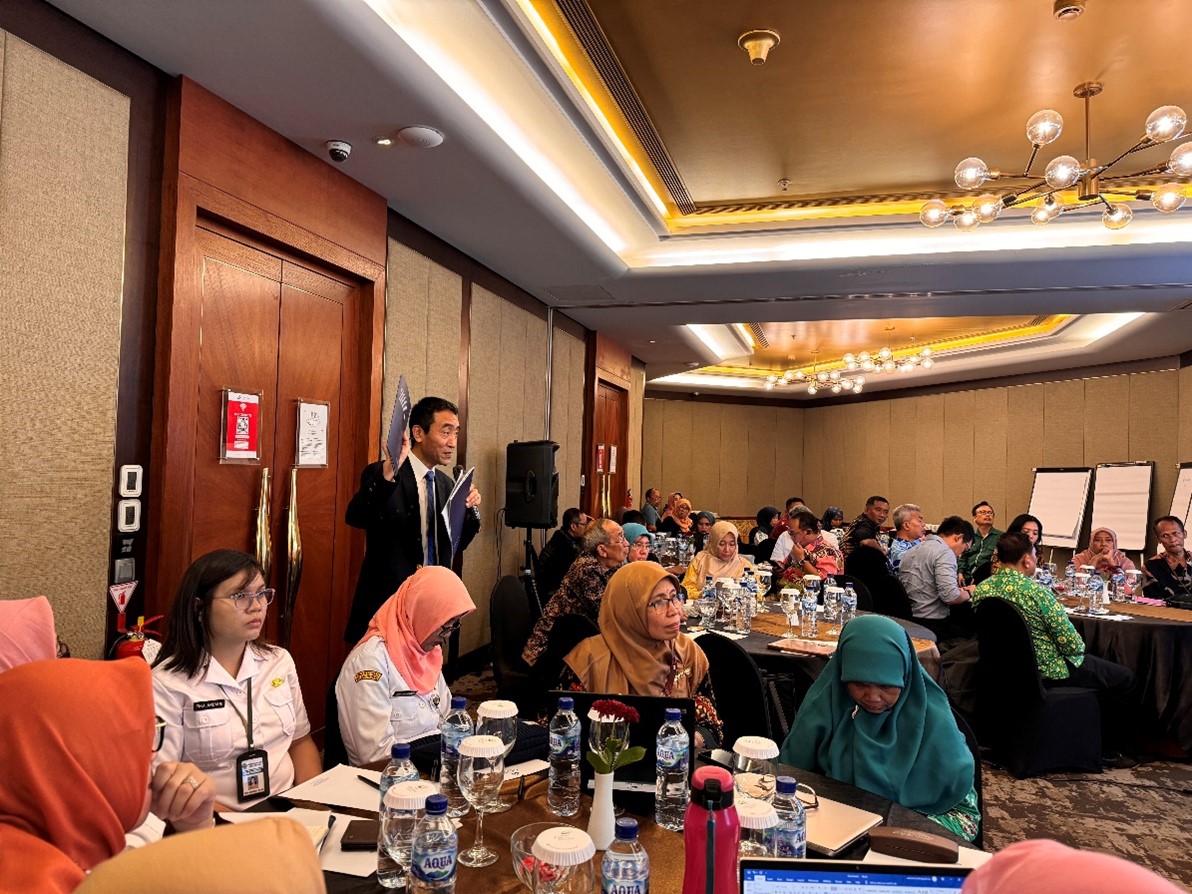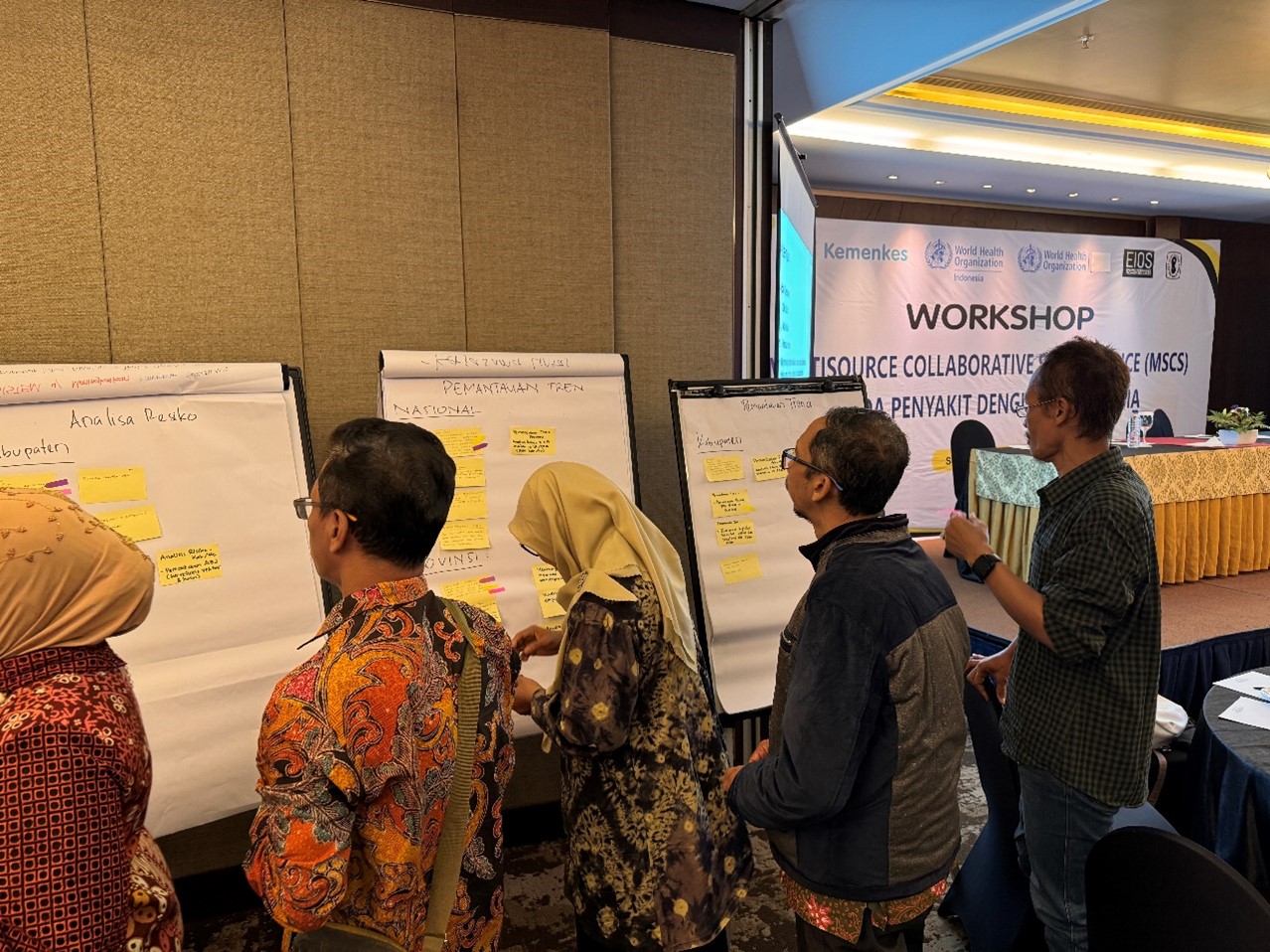On 10 July 2024 the Indonesian Ministry of Health (MoH) and World Health Organization (WHO) embarked on a three-day workshop in Central Java on implementing multisource collaborative surveillance (MSCS) for dengue, an acute public health threat globally and in Indonesia. MSCS aims to generate insights on health hazards and threats from diverse sources, to contextualize and better interpret data, and strengthen health emergency prevention, preparedness, response and resilience (HEPR).
In 2024, as of 1 July, 149 866 confirmed cases of dengue have been reported in Indonesia. This is approximately three times higher than the same period in 2023. Cases were reported from 465 districts across all 38 provinces of Indonesia, resulting in 884 deaths.
The MoH-led workshop was supported by WHO Indonesia, the WHO Regional Office for South-East Asia and the WHO Hub for Pandemic and Epidemic Intelligence. It involved 55 representatives from a range of key stakeholders, including MoH, provincial health offices; district health offices; the Meteorological, Climatology and Geophysical Agency; infectious disease modelers; epidemiologists and university researchers. MoH also invited the National Environment Agency of Singapore to share its experience of dengue data analysis for improved decision-making.

Through a series of scenario-based discussions, participants of the workshop identified specific objectives for surveillance of dengue and approaches to achieve them. They applied the six key steps contained in WHO’s forthcoming manual “Informing Public Health Decision-making with Multisource Collaborative Surveillance: A Step-by-Step Approach”, which aims to strengthen MSCS capacities and increase collaboration between and among key stakeholders.
“Across Indonesia, dengue is an increasingly acute public health challenge,” said Dr Triya Novita Dinihari, Head of Surveillance Department, MoH, Government of Indonesia. “The more information we have from as many sources as possible, the better we can prevent, prepare for and respond to the challenge, and build resilience against it. This is what the MSCS approach is all about, and why Indonesia has been so eager to apply WHO’s new operational manual.”
As climate change progresses, rising temperatures are expected to exacerbate dengue incidence globally and in Indonesia. In May 2024, WHO assessed the risk of dengue globally to be high, calling on Member States to strengthen early warning and immediate response capacities through a multisource, collaborative approach.
“Indonesia’s leadership on strengthening MSCS generally, but especially for dengue, reflects the country’s proactive approach to not just identify but act on the lessons learned from the COVID-19 pandemic,” said Dr N. Paranietharan, WHO Representative to Indonesia. “Strong, diversified MSCS is a critical tool for Indonesia to enhance public health intelligence and improve decision-making, and I commend Indonesia on its rapid uptake.”

Participants actively contributing ideas and strategies during the collaborative workshop (WHO/Agrin Zauyani Putri)
On 24 July, Dr Dinihari shared Indonesia’s MSCS experience with stakeholders of the Asia Pacific Health Security Action Framework (APHSAF). Launched in June 2024, the APHSAF covers 48 diverse countries and areas in the WHO South-East Asia and Western Pacific regions, which together are home to around 4 billion people.
The Framework is designed to engage multisectoral actors in health security and to reflect the complex nature of current and future public health emergencies. It presents six interconnected, multisectoral domains of work, building on the previous bi-regional Asia Pacific Strategy for Emerging Diseases and Public Health Emergencies, first established in 2005.
Indonesia’s experience with MSCS for dengue is expected to inform national efforts across Asia Pacific to implement the APHSAF, which will in turn complement and strengthen the global HEPR approach. At all three levels – country, regional and global – WHO will continue to support Indonesia to take decisive, pioneering action to strengthen MSCS and achieve a healthier, more health-secure and resilient future for all.
Written by Mushtofa Kamal, National Professional Officer (Surveillance), WHO Indonesia
